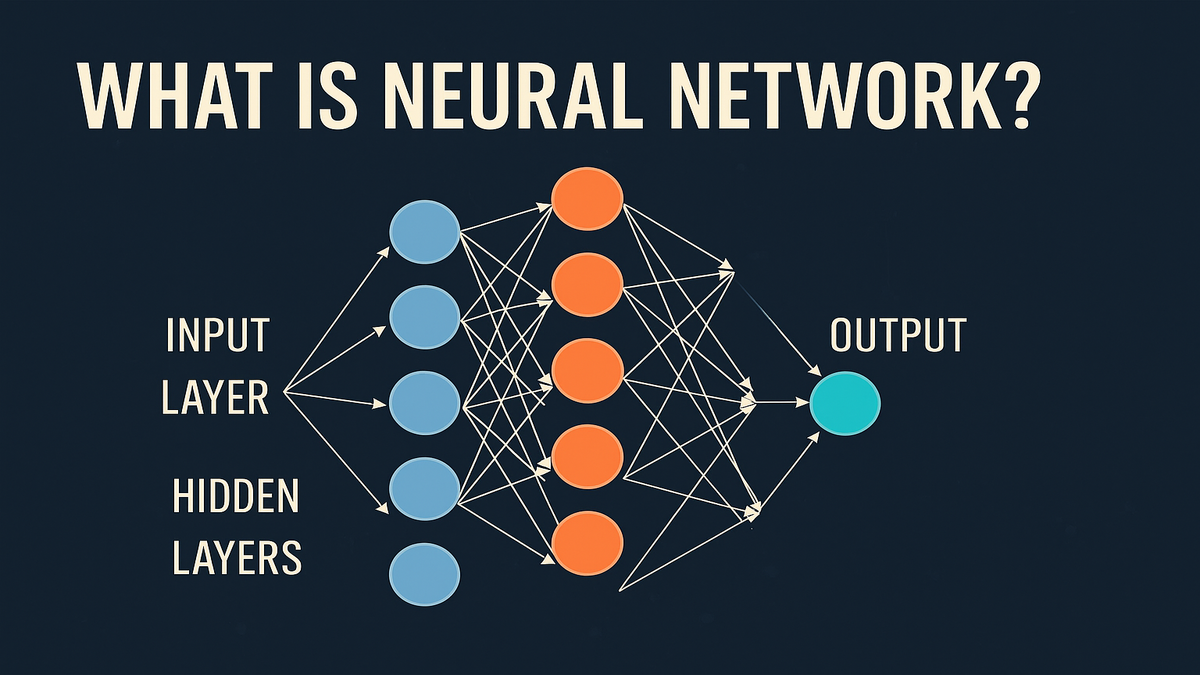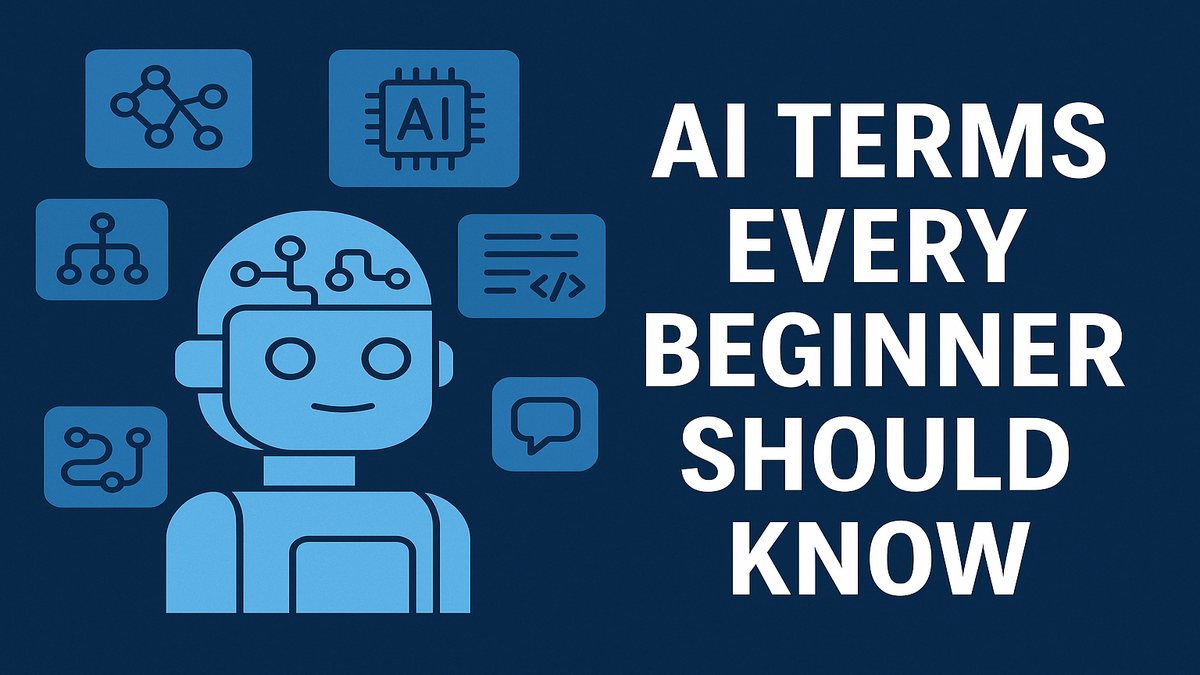Confused by means of complex AI jargon? This novice-pleasant manual breaks down the maximum essential AI terms every beginner should know in easy language. Learn the vocabulary of AI with no trouble!
Table of Contents
Introduction: Why Learning AI Terms Matters :
Artificial Intelligence (AI) is reshaping the world—from smart assistants like Siri to recommendation systems on Netflix. But diving into AI can feel overwhelming, especially when you’re hit with unfamiliar terminology. That’s why understanding the AI terms every beginner should know is the first step toward grasping this transformative technology.

In this guide, we’ll walk you through 20+ essential AI terms in a way that’s easy to understand, without needing a tech background. Whether you’re an aspiring AI developer, a curious learner, or someone exploring AI for your business, this blog is for you.
What Does “AI Terms Every Beginner Should Know” Mean?
The phrase AI terms every beginner should know refers to the fundamental words, phrases, and jargon used in the field of artificial intelligence. Knowing these terms builds your foundation and helps you engage with AI more confidently.
1. Artificial Intelligence (AI) :
Discover “AI terms every beginner should know” refers that AI is the department of laptop technological knowledge that creates structures or machines that mimic human intelligence. These machines can carry out responsibilities like learning, reasoning, and trouble-solving.

Why it subjects: AI is at the coronary coronary heart of each innovation on this problem. Understanding what it’s miles lays the foundation for every extraordinary time period.
2. Machine Learning (ML) :
Machine learning is a subset of AI where computers learn from data and improve over time without being explicitly programmed.
Real-world example: Your email’s spam filter learns from past emails to detect future spam.
3. Deep Learning :
A more advanced form of system learning, deep studying makes use of artificial neural networks to simulate how the human brain works. It’s used in facial popularity, voice assistants, and greater. So these “AI terms every beginner should know”.
4. Neural Networks :
These are algorithms designed to recognize patterns, inspired by how human brains work. They’re made up of layers of nodes (neurons) that process data in complex ways.

5. Natural Language Processing (NLP) :
This area of AI focuses on the interaction between computers and human language. NLP helps machines understand, interpret, and respond in human languages.
Example: ChatGPT and voice assistants like Alexa use NLP.
6. Algorithm :
An algorithm is a step-by-step set of instructions that computers follow to perform a task or solve a problem.
7. Dataset :
A dataset is a collection of data used to train AI models. The quality and size of a dataset significantly impact AI performance.
8. Training and Testing Data :
So these “AI terms every beginner should know” , AI models are trained using a part of the dataset (training data) and then evaluated using another part (testing data) to see how well they perform.
9. Model :
An AI model is the result of training an algorithm on a dataset. Once trained, it can make predictions or decisions.
10. Supervised Learning :
In supervised learning, the model learns from labeled data—meaning the input data is already matched with the correct output.
11. Unsupervised Learning :
Here, the model finds patterns in data without labeled outputs. It’s often used for clustering or grouping data.
12. Reinforcement Learning :
In this type of learning, the model learns by trial and error, getting rewards for good outcomes and penalties for mistakes—similar to training a pet.
13. Bias :
So these “AI terms every beginner should know” , Bias in AI occurs when the data used to train a model favors one group over another, often leading to unfair outcomes.
14. Overfitting :
This happens when an AI model learns the training data too well, including its noise and errors, which hurts its performance on new data.
15. Underfitting :
The opposite of overfitting, underfitting happens when the model doesn’t learn enough from the training data and performs poorly overall.
16. Inference :
Inference refers to the process of using a trained AI model to make predictions or decisions based on new input data.
17. Computer Vision :
This branch of AI deals with enabling machines to “see” and understand visual information from the world.
Example: Face recognition systems on smartphones.
18. Prompt Engineering :
Prompt engineering is the technique of crafting effective inputs (prompts) for AI models like ChatGPT to get desired responses.
19. Chatbot :
A chatbot is an AI program designed to simulate conversation with users—commonly used in customer service. So these “AI terms every beginner should know” .
20. Generative AI :
Generative AI refers to systems that can create new content like text, images, or music, based on the data they’ve been trained on.
Example: Tools like ChatGPT and DALL·E.
21. Token :
In language models, a token is a piece of text (like a word or a sub-word) that the model reads and processes. Models like ChatGPT break text into tokens to understand and respond.
22. LLM (Large Language Model) :
LLMs are massive AI models trained on vast datasets to understand and generate human-like text. So these “AI terms every beginner should know” .
Why These AI Terms Matter to Beginners :
Grasping these AI terms every beginner should know helps you:
- Understand AI news and trends
- Communicate with AI developers or teams
- Explore AI tools more effectively
- Build a solid foundation for further learning
When you start recognizing these terms in articles, tools, and conversations, you’ll feel more confident navigating the AI world.
Tips to Remember AI Terms Easily :
- Use Flashcards: Write the term on one side and the definition on the other.
- Watch YouTube videos: Visuals can enhance your understanding.
- Use the terms in real life: Try using them in conversations or when exploring AI tools.
- Quiz yourself: Take mini quizzes to reinforce your learning.
- Follow AI blogs (like yours!): Reading regularly makes you fluent in AI vocabulary.
Final Thoughts: Your First Step into the AI World :
Understanding the AI terms every beginner should know is like mastering the alphabet earlier than writing sentences. With this vocabulary, you will be higher geared up to discover, use, and even create AI-pushed solutions.
As AI continues to grow and contact every part of our lives—from healthcare to leisure—your familiarity with those phrases will empower you to stay in advance in a tech-pushed global.
So bookmark this manual, share it together with your fellow freshmen, and hold exploring. This is just the start of your AI adventure!

